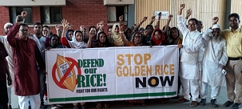
Farmers, agricultural workers escalate fight against commercial release of genetically-engineered rice in Bangladesh
 Together with several small farmers and peasant organizations, the IUF-affiliated Bangladesh Agricultural Farm Labour Federation (BAFLF) and National Women Farmers and Workers Association (NWFA) escalated the fight to stop the commercial release of genetically-engineered "golden rice", following the announcement by the Minister of Agriculture that commercial growing will start "within three months".
Together with several small farmers and peasant organizations, the IUF-affiliated Bangladesh Agricultural Farm Labour Federation (BAFLF) and National Women Farmers and Workers Association (NWFA) escalated the fight to stop the commercial release of genetically-engineered "golden rice", following the announcement by the Minister of Agriculture that commercial growing will start "within three months".
The Bangladesh Rice Research Institute (BRRI) started confined field tests of genetically engineered rice at its Gazipur research centre in 2017 despite the concerns of researchers and staff. Four years earlier in 2013, the Bangladesh government approved the commercial cultivation of genetically engineered Bt. Brinjal despite bio-safety concerns about the unstable, unpredictable effects of GM crops and the threat to bio-diversity.

Continuous protest actions inside the the BRRI where BAFLF members are opposed to the commercial release of the first GM rice in Bangladesh
BAFLF and NWFA has called for an end to GM crop trials, a ban on Bt. Brinjal cultivation, restrictions on the import and use of harmful chemical pesticides, and a comprehensive review to strengthen the 2012 Bio-safety Rules. Corporate agribusiness has exploited Bangladesh's weak bio-safety regulations to promote commercialization of GMO crops despite the threat to the environment, food security and public health. "Golden rice" has been widely rejected as a failed technology that poses significant risks. Despite this it is being dumped in Bangladesh. "Multinational companies are using Bangladesh as laboratory for GM crop experiments and using people and farmers as guinea-pigs for their own interest," said BAFLF General Secretary, Abdul Mazid. "This also poses a threat to farmers and farm workers' livelihoods and employment."
 Facebook
Facebook Google+
Google+ Reddit
Reddit Twitter
Twitter






